| The Big Five* |
1. Rules: Establish and teach classroom rules to communicate expectations for behavior.
2. Routines: Build structure and establish routines to help guide students in a wide variety of situations. New teachers deserve better. It is time for teacher prep programs to focus on classroom management so that first-year teachers are prepared on day one to head off potential disruption before it starts.
3. Praise: Reinforce positive behavior using praise and other means.
4. Misbehavior: Consistently impose consequences for misbehavior.
5. Engagement: Foster and maintain student engagement by teaching interesting lessons that include opportunities for active student participation.
Based on these strategies which are so strongly supported by research, we would like to ask you to choose one of the following situations and develop a short solution for it.

1. An authoritarian teacher who has few teaching tools uses a contradictory speech in an attempt to maintain the discipline of the class.
2- A pre-service teacher in her practicum whose class is out of control.

